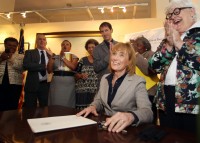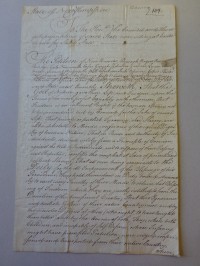 Fourteen of the 20 slaves who in 1779 signed a petition asking the New Hampshire General Assembly to grant them their freedom were posthumously emancipated on Friday, June 7th, when Governor Maggie Hassan signed a bill declaring them free. The bill was submitted earlier this year by state Senator Martha Fuller Clark of Portsmouth. Both the House and Senate passed it unanimously.
Fourteen of the 20 slaves who in 1779 signed a petition asking the New Hampshire General Assembly to grant them their freedom were posthumously emancipated on Friday, June 7th, when Governor Maggie Hassan signed a bill declaring them free. The bill was submitted earlier this year by state Senator Martha Fuller Clark of Portsmouth. Both the House and Senate passed it unanimously.
Written in the language of natural rights and freedom that was widespread in the press, broadsides and speeches of Revolutionary America, the petition (pdf text here) protested that the undersigned had been brutally torn from their native land while still but children and forced into servitude in a land where “knowledge, christianity and freedom, are their boast.”
Therefore, your humble slaves most devoutly pray, for the sake of insured liberty, for the sake of justice, humanity, and the rights of mankind; for the honor of religion, and by all that is dear, that your honors would graciously interpose in our behalf, and enact such laws and regulations as in your wisdom . . . we may regain our liberty and be rank’d in the class of free agents, and that the name of SLAVE may no more be heard in a land gloriously contending for the sweets of freedom; and your humble slaves as in duty bound will ever pray.
When the petition was first submitted to the General Assembly in April 1780, the legislators scheduled a hearing and ordered the text be published in the New Hampshire Gazette so “that any person or persons may then appear and shew (sic) cause why the prayer thereof may not be granted.” By the time it was published on July 15th, 1780, the General Assembly had postponed the hearing declaring “the House is not ripe for a determination in this matter: Therefore ordered that the further consideration and determination be postponed till a more convenient opportunity.”
 A more convenient opportunity never arose. Six of the petitioners, including Prince Whipple, slave of William Whipple, a New Hampshire delegate to the Continental Congress and a signer of the Declaration of Independence, gained their freedom before their death. The other fourteen, including Nero Brewster, slave of Col. William Brewster and King of the Negro Court, a shadow justice system in which the slaves of the most prestigious owners ruled on petty crimes committed by slaves, were still property when they died.
A more convenient opportunity never arose. Six of the petitioners, including Prince Whipple, slave of William Whipple, a New Hampshire delegate to the Continental Congress and a signer of the Declaration of Independence, gained their freedom before their death. The other fourteen, including Nero Brewster, slave of Col. William Brewster and King of the Negro Court, a shadow justice system in which the slaves of the most prestigious owners ruled on petty crimes committed by slaves, were still property when they died.
The petition sank into obscurity until it was rediscovered in the state archives 30 years ago. It was still pretty obscure until an archaeological find revealed an important piece of New Hampshire’s African-American history. Ten years ago, the remains of 13 people of African descent were discovered during construction work in downtown Portsmouth. This was mentioned in documents as the “Negro Burial Ground” as early as 1705 when it would have been on the outskirts of the city. It’s the only African cemetery from this period known in all of New England. The burial ground was overtaken by the growth of Portsmouth starting in the late 18th century and soon it too was forgotten.
The discovery of the African Burying Ground revived interest in the petition and in the history of slavery and African-American society in Colonial and early Federal New Hampshire. The city appointed the African Burying Ground Committee to work on a fitting memorial on the site of the burial ground. It’s a challenging prospect because there are houses and people live there and because there are still human remains, likely buried at very shallow depths, so construction options are limited. In 2009, the committee submitted a design for the African Burying Ground Memorial Park, a 6,500-square-foot public space that will include landscaping, sculptures, historical information plaques, seating walls, a piazza and inscriptions of quotes from the 1779 freedom petition to create a quiet, beautiful contemplative space that honors the people who slumber eternally beneath the ground.
The estimated construction cost for the memorial park is $1.2 million. The committee is raising money (donation form here) and hope to break ground on the park this fall. To help raise interest, historians and committee members also lobbied the Portsmouth representative to submit the bill emancipating the petitioners. As of Friday, Nero Brewster, Samuel Wentworth, Cato Warner, Seneca Hall, Pharoah Rogers, Cato Newmarch, Winsor Moffatt, Garrett Colton, Peter Frost, Quam Sherburne, Will Clarkson, Zebulon Gardner, Cipio Hubbard and Kittindge Tuckerman are free. They just had to die and wait 200 years.